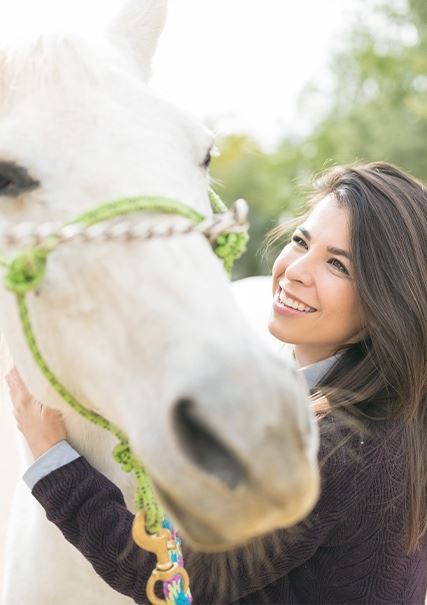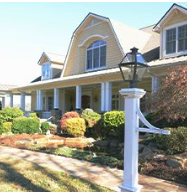
Get Help From Silver Ridge
"*" indicates required fields
A Complement to Addiction Recovery in Asheville, North Carolina
Equine-assisted therapy is increasingly used in Asheville, North Carolina, as a powerful complement to traditional treatments for drug and alcohol addiction recovery. This form of therapy offers more than just a unique experience; interacting with horses can be both fun and deeply therapeutic.
Horses possess a wide range of personalities—they can be curious, playful, stubborn, anxious or affectionate. Their behavior is often unpredictable, and this unpredictability becomes a key aspect of therapy. When a person in recovery engages with a horse during equine-assisted therapy, the horse’s reactions can reveal valuable insights about that person’s emotional state. These observations allow therapists in Asheville to better understand and guide individuals through their recovery journey.
Equine-assisted therapy in Asheville provides a meaningful way for people to connect with their emotions and heal, making it an effective addition to their overall recovery process.
A Reflection in Behavior with Equine-Assisted Therapy in Asheville, North Carolina
Equine-assisted therapy, a key component of holistic therapy for addiction treatment, offers unique insights into personal behavior. In Asheville, North Carolina, this approach helps individuals in recovery understand how their actions and tendencies impact relationships.
For instance, if someone tends to be overly accommodating in their personal life, they may display the same behavior when interacting with a horse. Similarly, those who struggle with control issues might attempt to dominate the horse’s behavior. The immediacy of the horse’s responses makes these tendencies easy to observe and reflect upon, providing a tangible way to see how certain behaviors contribute to challenges in everyday interactions.
Equine-assisted therapy in Asheville allows people in recovery to recognize these patterns in real-time. By reflecting on the horse’s reactions, individuals can gain deeper awareness of their actions, which is essential for holistic addiction treatment and personal growth.
What Is Equine-Assisted Therapy in Asheville, North Carolina?
Equine-assisted therapy is a specialized form of therapy that focuses on the therapeutic interaction between individuals and horses. In Asheville, North Carolina, this therapy is increasingly used as part of addiction recovery, providing an opportunity for people to connect with animals in a healing environment.
Therapeutic Activities in Equine-Assisted Therapy
During equine-assisted therapy sessions, participants engage in activities such as grooming, feeding and leading horses. These sessions are overseen by a licensed mental health therapist, often with the assistance of an equine professional. While horseback riding may sometimes be included, the core of equine-assisted therapy focuses on the relationship-building between the recovering individual and the horse.
Key elements of equine-assisted therapy in Asheville include:
- Interacting with Horses – Although many imagine equine therapy as riding lessons, the emphasis is on interacting with horses. This non-verbal communication helps people gain insight into their behaviors and how they relate to others.
- Grooming – Recovering individuals participate in grooming activities like brushing and currying. These repetitive, physical actions promote relaxation and mutual trust between the person and the horse.
- Fitting a Halter – Tasks such as fitting a halter to a horse, while simple, can reveal much about a person’s emotional state. Horses are highly sensitive to human emotions, and their reactions—becoming stubborn or skittish—can reflect the person’s inner feelings, such as aggression or anxiety.
Equine-assisted therapy provides a reflective experience, allowing individuals in recovery to observe a horse’s responses and develop greater self-awareness. This makes it an effective tool for addiction treatment, encouraging people to become more mindful of their thoughts, emotions and behaviors as they progress through their recovery journey.
What Happens During an Equine-Assisted Therapy Session in Asheville, North Carolina?
In Asheville, North Carolina, an equine-assisted therapy session brings the therapeutic process outdoors, allowing participants to engage with horses in settings such as paddocks, barns or arenas. While each therapist may incorporate unique activities, the general structure of the sessions tends to follow a similar pattern.
Herd Dynamic Observation
Individuals new to equine-assisted therapy might begin by observing the herd rather than interacting directly with the horses. Watching the herd’s interactions often reflects or mirrors the participant’s own emotions, offering valuable insight into their current mental and emotional state.
Structured Activities
As therapy progresses, individuals participate in structured activities. These can range from simple tasks like grooming to more involved exercises, such as leading a horse through a course. Each activity is designed to foster a connection with the horse, a gentle, non-judgmental animal that provides a safe space for healing.
Activities may vary depending on the therapist’s approach, the available horses, and the unique needs of the individuals in the session. Ultimately, the goal of equine-assisted therapy in Asheville is to help people in recovery build self-awareness, foster emotional growth and create a sense of calm through interactions with horses.
Equine Therapy for Addiction Recovery in Asheville, North Carolina
Equine-assisted therapy, available in Asheville, North Carolina, offers individuals in addiction recovery a unique therapeutic experience. This form of therapy involves working with horses under the guidance of a trained equine therapist, allowing participants to benefit from nature and the responsibilities of caring for another living being.
Building Empathy and Responsibility
For many, the task of caring for a large animal like a horse can be humbling. It fosters empathy, encouraging participants to recognize how their actions affect the horse. This connection can help individuals develop emotional awareness, which is crucial in addiction recovery.
Mirror Behaviors
Horses are known for mirroring human behaviors and emotions. During equine-assisted therapy sessions, individuals can observe how their attitudes or behaviors are reflected back by the horse. This mirroring effect helps people recognize and understand their negative tendencies, allowing them to work through self-defeating patterns that may contribute to addiction.
Developing Self-Confidence
Equine therapy also enhances self-confidence. Caring for horses involves completing essential tasks that teach responsibility and accountability. By providing this care, individuals build trust in themselves and their abilities, which is a critical component of recovery.
After each session, therapists discuss the participant’s realizations, offering insights into how working with horses can help them process emotions. For those who struggle with traditional one-on-one therapy, this non-verbal interaction can open new pathways to healing.
Benefits of Equine-Assisted Therapy in Addiction Treatment
Facing Strong Emotions
Interacting with large animals like horses can evoke powerful emotions, such as love and fear. Overcoming the fear of such a gentle, non-judgmental creature can help participants gain confidence, a skill they can apply to other emotional challenges they face in recovery.
Processing Emotions vs. Escaping
Many individuals with addiction have used substances to escape painful emotions. Equine therapy helps people reconnect with their emotions without trying to numb them. The non-verbal communication between the person and the horse allows participants to experience and process their feelings in a healthy, supportive environment.
Learning Trust
Trust is often damaged in addiction. Horses, while large and imposing, are gentle and accepting. By working closely with these animals, participants in equine therapy begin to rebuild their ability to trust, which can carry over into relationships with others in their lives.
Equine-assisted therapy in Asheville is a powerful tool for addiction recovery, providing a holistic approach that nurtures emotional growth, trust and self-awareness.
Is Equine-Assisted Therapy Covered by Insurance in Asheville, North Carolina?
In Asheville, North Carolina, equine-assisted therapy is often covered by most third-party medical insurance providers. However, it’s important to note that therapeutic riding sessions, which are considered recreational, are typically not covered. Equine-assisted therapy, in contrast, is viewed as a therapeutic treatment for mental health and addiction recovery, which may qualify for reimbursement depending on the insurance plan and provider. Always check with your specific insurance company to confirm coverage for equine-assisted therapy services.
Integrating Equine-Assisted Therapy into Life After Treatment
Recovery doesn’t end when rehab does—it’s a continuous journey that requires a variety of coping strategies and tools to maintain long-term abstinence. Equine-assisted therapy, with its unique therapeutic benefits, can play a significant role in sustaining recovery even after formal treatment has concluded.
Aftercare Support
Addiction specialists often develop robust aftercare plans for individuals leaving rehab. These plans ensure continued access to treatment, therapy and support networks to help navigate the challenges of ongoing recovery. Integrating equine-assisted therapy into aftercare programs can provide an additional emotional outlet and coping strategy.
Continued Participation
For those who found equine-assisted therapy beneficial during rehab, maintaining a connection with the therapy can be essential. Participating in equine therapy sessions after treatment helps reinforce positive behavioral changes, emotional awareness and stress management, offering continued healing and growth in everyday life.
Incorporating equine-assisted therapy into your life after treatment helps create a consistent and enriching therapeutic experience that supports long-term recovery.






